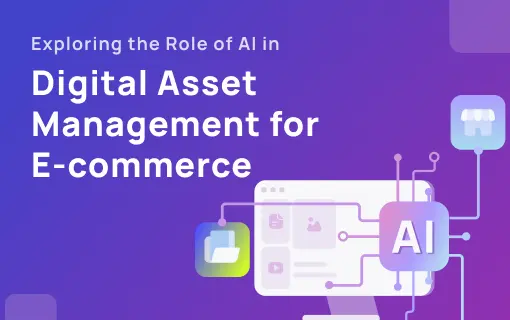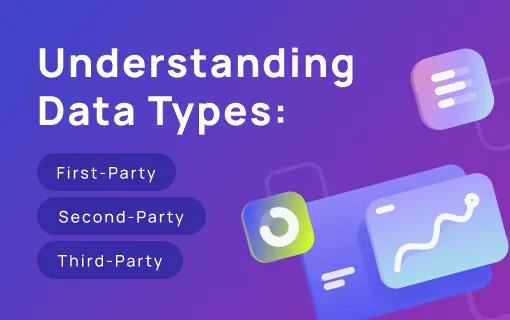Data.
Business leaders, marketers, and salespeople love it, and we all create it.
This is why good product information management, also known as PIM, is vital for any business - especially those online.
There’s so much data floating around online that Forbes estimated there were 44 Zettabytes (ZB) of digital information collected in 2020 - that’s 44 trillion Gigabytes (GB).
Within this vast sea of data lies your holy grail of product information.
While a tiny fraction of the world’s data, a single business’ product information can be a lot to handle: hundreds of products (or more), each with its own long set of data tags on color, dimensions, product type, etc.
Essential not only for keeping your business organized, PIM systems can now be integrated into online stores, allowing you to spot buying trends, automate purchasing and delivery, and improve distribution efficiency.
When combined with AI, Product Information Management tools transform into a whole new level of usefulness.

Why is Product Information Management Important, and How Can AI Help?
Good product information management is no longer simply a “nice-to-have” that makes running your business a little easier—it’s a crucial crutch that can make or break your business’s success when selling online.
This is because accurate, easily accessible, and integrated information is vital when selling products online—not just for customers but also for search engines.
Many different aspects of your business can see a massive boost through AI-driven Product Information Management Systems:
Boosting SEO and Discoverability
Before customers can buy from you, they need to find you. Online, the number one way to get discovered is to have excellent SEO, which ensures you rank at the top of relevant search results.
Good PIM is critical for ensuring Google (and other search engines) sees your website as a reputable and relevant result.
Integrating AI into your product management systems helps automate this, while ensuring your data is optimized for search engine readability.
Improving the Customer Experience
Within your own website, you’ll likely have your own search abilities and product categories.
AI-driven PIM ensures your product information is always accurate, organized, and up-to-date, helping customers find the product they’re looking for faster.
Getting to Market Faster and Better
Whether launching a whole new range of products or refreshing a catalog, efficient PIM integrated with AI makes adding and updating product information much easier, allowing you to bring products to market as quickly as you need.
These are just a few of the top benefits of AI-driven PIM systems.
They can also help keep businesses compliant with regulations and ensure product information remains consistent across multiple sales channels.
Ready to see how PIM systems integrated with AI can help boost your business? Get a demo of Trustana today to find out!
Key Features of Trustana's PIM and DAM Solutions
Our AI-powered Product Information Management solutions (PIM) combine with overall Digital Asset Management (DAM) to create a comprehensive service for managing your products online.
For any business seeking exceptional digital organization, PIM and DAM software go hand in hand, with PIM needed to organize and enrich product data and DAM covering relevant digital assets for your products such as images and videos.
With Trustana’s AI product management tools, your digital catalog of products can be more than just well organized.
Where PIM and DAM are Best Applied
Our services focus on saving you time, increasing the effectiveness of your digital storefront, and automating the organization of your product catalog.
Along with standard product information management and digital asset management, our unique AI tools allow us to offer specialized features to help boost your business:
Smart Importer:
This AI tool is designed to extract and categorize your product information from a range of different sources such as spreadsheets and supplier catalogs, as well as even unstructured data.
Perfect for any business with large catalogs, multiple suppliers, or regular product range updates, this tool is ideal for saving vast amounts of human time, and reducing the stress levels of anyone working on your IT.
Data Enrichment:
Advanced AI algorithms allow you to quickly, accurately, and automatically update your products with additional attributes and information improvements.
Our Data Enrichment tool analyzes your current product information for each product, and then suggests additional data to add to each product’s information set based on other similar products.
This is ideal for anyone in eCommerce, as it ensures all products have consistent information.
For example, if most of your products have information about height, color, and weight, and one product does not have any information on its color, this tool will automatically suggest adding this information.
Product Taxonomy:
If you want users to buy from you, you must make it as easy as possible for them to find the product they want.
But with hundreds of products across multiple different ranges, organizing all of them into logical groups can be highly time-consuming.
That is, unless you have a product taxonomy tool.
This automatically organizes your products into logical groups and a hierarchical structure based on their product information. Through more efficient data handling, you can create an easy-to-navigate catalog of products for your customers to browse, perfect for sales teams in directing customers to the intended product.
These combine with various other AI tools such as AI localization, automated image tagging, the ability to provide custom product suggestions to each new customer, and much more.
Benefits of Integrating AI in Marketplaces
Trustana’s AI PIM solutions are more than just organizational tools.
When used correctly, we can help deliver clear and immediate boosts to engagement, customer interactions, and sales. When you use Trustana, you see a return on your investment twice over:
Save Time and Money with Trustana
Your first ROI comes with saved time, higher efficiency, and less money/time spent fixing human errors.
Our AI data management solutions are highly sophisticated, allowing you to focus on more important work while our tools get to work organizing, integrating, and enriching your product information and digital assets.
This makes your team more efficient, takes care of the grunt work of organization, and helps you catch potential errors in your product information.
Make More Money with Trustana
There’s no better way to put it: Trustana helps you make more money.
We help deliver more Search Engine-Optimized product data, which brings more customers to your site. Our automated organization of your product data and digital assets ensures your product listings are easy to explore and discover, increasing customer satisfaction.
Even better, our tools like AI-powered product suggestions, more accurate image tagging, and AI localization all help increase conversions, as Trustana client SharkNinja found out:
“Trustana’s AI powered solution was able to generate A+ content using our existing assets and … complete our product attribute details to improve the product listings. This has saved us countless hours and increased our conversion rates significantly.” - Swetha Vigraham, director of ECommerce at SharkNinja
With money to be saved and even more to be made, book a demo with the Trustana team today to discover exactly how we can help you transform your business.
Real-World Applications and Success Stories
In 2023, online retailer Primea was new to market, and needed to onboard products as quickly as possible.
The initial options weren’t promising: online freelancers could be risky and deliver varied results, while a local intern wouldn’t have been time or cost-effective.
Then, they discovered Trustana.
“Trustana has been a total game-changer for me. With Trustana, I’ve saved months, not days, of work, and can focus on the high value stuff – building my brand, investing in my supplier relationships, and providing top-tier customer service.” - Kash Singh, founder of Primea
Through using Trustana’s AI-backed PIM and DAM solutions, Primea was able to rapidly onboard products and their relevant product information.
Within five days, Trustana’s onboarding solution was set up, and within two weeks, Trustana had converted Primea’s backlog of SKUs full of scarce and incomplete data into the first batch of sales-ready product listings.
Using AI technology, Trustana was able to rapidly and automatically organize messy catalog listings, as well as enrich the data to fill in the gaps and have Primea’s completed product listings ready for market.
Singh estimated that Trustana had saved Primea around 200 human days of work, all completed within a few weeks.
How to Get Started with an AI PIM
Trustana’s PIM and DAM solutions are specially designed to integrate easily with your existing systems and various platforms including Shopify, Amazon, and many others.
Our unique tool Trustana Connect smoothly connects to your existing systems such as web shops, Enterprise Resource Planning (ERP) systems, and marketplace integrators, ensuring your setup of Trustana is a breeze.
It is even capable of adapting to custom needs and niche systems through its open API.
All throughout the process, our experienced team is on-hand to help you with any questions you may have.
We are unapologetically customer-focused, which means we always prioritize your success. We are with you every step of the way, helping you get the most out of our services.
Book a demo with us today to find out more, and discover how Trustana can help your business specifically to improve efficiency, save time, and see the ROI that you deserve.






